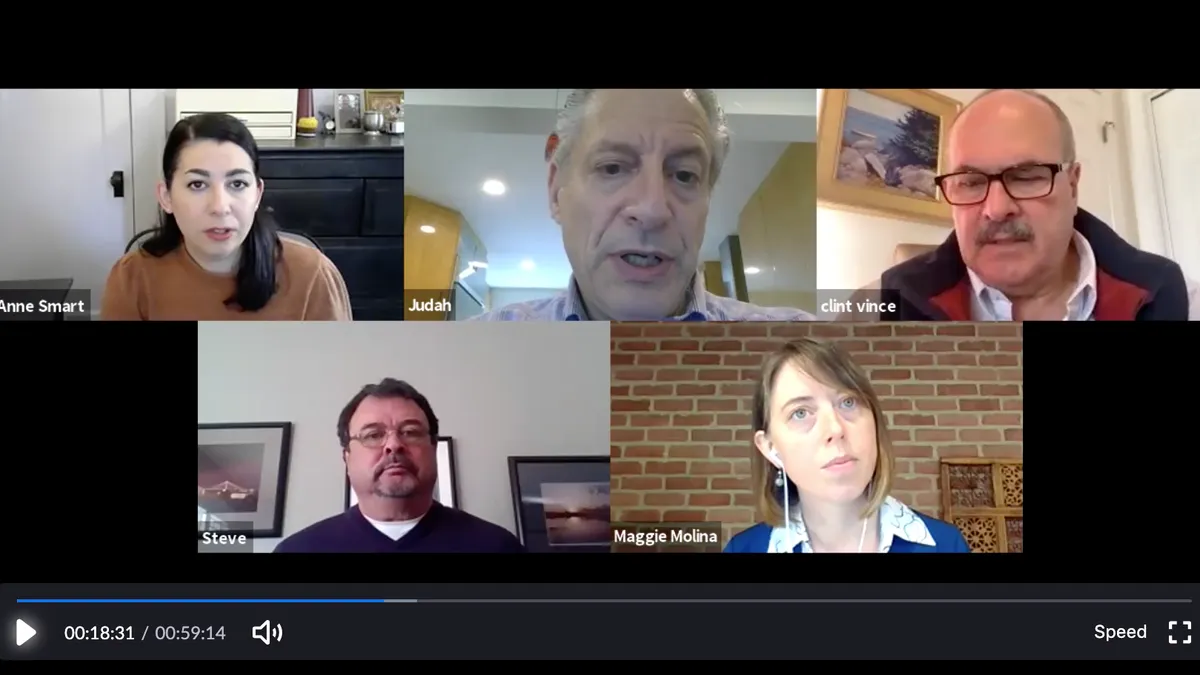As parts of the U.S. begin to reopen in the wake of the coronavirus pandemic, it is likely a matter of time before most banks see their operations return to something resembling normal. But hiring practices may be one exception.
Social distancing has forced companies to replace face-to-face interviews with those done via technology platforms such as Zoom or Skype, and that may be the status quo for a while.
"Companies won't be bringing candidates into the office for a long time," said Anthony Colaguori, a Pittsburgh-based recruiter. "I'm thinking that won't happen until there is a vaccine. No company is going to want a stranger coming in."
Many banks prefer a national search effort, especially for C-level openings, and flying candidates in and out of town can get expensive anyway, said Bruce Kershner, president of Kershner & Co., an executive search firm focused on financial institutions.
Using video is preferable for the initial interview — regardless of the pandemic — because trying to arrange the interviewers' schedule to meet candidates in person is always a challenge, Kershner said.
"It sure gets the ball rolling when the labor market is tight and you don't want to run the risk of losing a strong prospect," he said.
Quentin Marshall, head of private banking at British lender Weatherbys, told Bloomberg he's found interviewing remotely broadens the candidate pool.
Jeanne Branthover, managing partner and global head of the financial services practice at the executive search firm DHR International, said her day now often stretches from 7 a.m. to 1 a.m., and involves more intensive work before and after the interview.
"Everything is more now — more virtual meetings than there would have been in person, more reference-checking, more use of assessment tools," such as personality tests to evaluate how someone gets along with others, she said.
Kershner said he would have advised companies against making a final hiring decision based on a video meeting alone before the coronavirus, but now they have little choice.
"You always want that face-to-face to be able to shake someone’s hand before you make a final decision, but I find people tend to be less nervous on a video call, which makes them more forthcoming and honest," he said. "On a video call, there tends to be less chit-chat, and people are less likely to put on a show."
Video interviews are about 80% as effective as those conducted face to face, and there is also a learning curve in using them, said Carll Wilkinson, a managing partner at executive search firm Smith & Wilkinson.
Interviewers should test the audio and video beforehand to troubleshoot, Wilkinson said. Banks should also put their hiring teams in a room where the primary light source is not behind them. "If you sit in front of a window, the light will wash out the image," he said.
If the interviewer is using a laptop, it is a good idea to set it on a few books so the camera it isn’t shooting from below as that is often an unflattering angle, Wilkinson said, adding that interviewers should be mindful of what's in the video’s background.
"Try to keep pets and kids far away," he said.
Video interviewing creates awkwardness, Colaguori said. Sometimes there is a lag, and both sides can miss cues as to when to speak.
Wilkinson recommended that interviewers use a blueprint of thoughtful questions to avoid dead air.
Teams that interview together frequently may have nonverbal cues such as an eye-wink or thumbs-up that they use to communicate during in-person interviews, said Thomas Duryea, CEO of the $258 million-asset Summit Bank in Oakland, California. Those may not translate to video when everyone is on a different screen, so interviewers need to find ways to adapt.
Duryea said it is also crucial that the interviewing team is on the same page on how to handle next steps in the process. "You may have a hiring manager who is eager to advance a candidate, and a peer who sees red flags, so planning out the interview in advance will spare you from miscommunications to candidates," he said.
Colaguori said it is critical to have no more than one interviewer and one candidate paired up at a time because more than two people can make it confusing as to who is saying what.
"Go into the interview knowing that everyone is going through something different today," he said. "These are difficult times, but at the core it is still one person talking to one person."
Pinnacle Credit Union in Atlanta has long conducted at least the initial interview by video chat, said Matt Selke, the $74 million-asset company’s CEO. But he said an in-person interview — following social distancing guidelines — should still be critical in making a smart hire. "If they are worried about coming to the workplace [for the interview], would that person come into work?" he said.




















